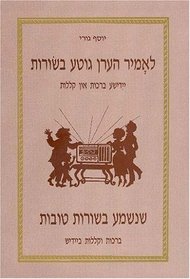Search -
Let's Hear Only Good News: Yiddish Blessings and Curses (English, Yiddish, Hebrew & Russian) (Yiddish Edition)
Let's Hear Only Good News Yiddish Blessings and Curses - English, Yiddish, Hebrew & Russian - Yiddish Edition
Author:
SHENISHMA BSOROT TOVOT. A first attempt is made here to portray this folklore genre in Yiddish lexicography. The 200 blessings and around 450 curses included in this dictionary are arranged alphabetically. The Yiddish entries are accompanied by their equivalent in Hebrew, Russian and English. Also added are literal translations (in Hebrew and En... more »
Author:
SHENISHMA BSOROT TOVOT. A first attempt is made here to portray this folklore genre in Yiddish lexicography. The 200 blessings and around 450 curses included in this dictionary are arranged alphabetically. The Yiddish entries are accompanied by their equivalent in Hebrew, Russian and English. Also added are literal translations (in Hebrew and En... more »
ISBN-13: 9789659025022
ISBN-10: 9659025025
Publication Date: 1/1/2004
Pages: 280
Edition: 2nd Revised Edition
Rating: ?
ISBN-10: 9659025025
Publication Date: 1/1/2004
Pages: 280
Edition: 2nd Revised Edition
Rating: ?
0 stars, based on 0 rating
Publisher: The Hebrew University Magnes Press
Book Type: Paperback
Members Wishing: 1
Reviews: Amazon | Write a Review
Book Type: Paperback
Members Wishing: 1
Reviews: Amazon | Write a Review
Genres:
- Literature & Fiction >> Genre Fiction >> Fairy Tales
- Literature & Fiction >> World Literature >> Mythology >> Folklore
- Reference >> Encyclopedias & Subject Guides >> Mythology & Folklore
- Nonfiction >> Foreign Language Nonfiction >> More Languages >> Yiddish
- Humor & Entertainment >> Humor >> General




